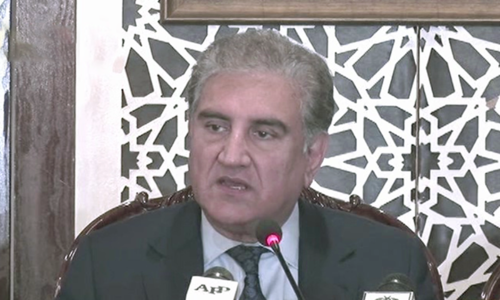WASHINGTON: The United States and Taliban are set to sign an agreement in Doha, Qatar, on Saturday that both hope would bring peace to Afghanistan and end America’s longest war.
Last week, the two sides concluded a “reduction in violence” deal, agreeing that if violence remained contained for a week, they would sign the peace agreement in Doha on Saturday.
And on Friday, US Secretary of State Mike Pompeo indicated that the US felt the condition had been met and was ready to sign the deal. “We have seen just these last six days a significant reduction in violence in Afghanistan,” he told House of Representatives Foreign Affairs Committee.
But the same day, 22 House Republicans sent a letter to Mr Pompeo, expressing “serious concerns” about the Trump administration’s plans to sign the deal.
“We are seeking assurances that you will not place the security of the American people into the hands of the Taliban, and undermine our ally, the current government of Afghanistan,” they wrote.
The week-long reduction in violence agreement followed nearly two years of protracted negotiations between the US and Taliban in Doha. Now, both sides appear keen to conclude the deal as planned. For doing so, they also have ignored the clashes that killed 19 security personnel and four civilians in Afghanistan this week.
“Everybody is happy, even people that are normally against me, like 99.9 percent of the time, because we’ve been there for 19 years,” said US President Donald Trump while explaining why he wanted to end the Afghan war now.
“We’re really serving not as a military force as we are a police force. And we’re not a police force,” he said. “We could act as a military force to win” but “I don’t want to kill millions of people — innocent people,” he said.
But the 22 lawmakers who wrote a letter to Mr Pompeo, urged him “not to commit America to a dangerous deal with the Taliban that would abandon (his) track record of strengthening America and putting our security and interests first.”
At a news briefing earlier this week, Mr Pompeo addressed some of these concerns, assuring sceptics that the deal would ensure Afghanistan was no more used for planning attacks against the United States and its allies.
There’s another concern that seems to have persuaded Washington to sign an agreement now, serious differences within the ruling coalition in Afghanistan. America set up this coalition by creating the post of a chief executive, Abdullah Abdullah, within the government who worked with the president almost as an equal.
But since the September 2019 president elections, both President Ashraf Ghani and Mr Abdullah have indicated that they want a new arrangement. The Americans, however, do not want to start a new process that could endanger their deal with the Taliban.
Published in Dawn, February 29th, 2020














































